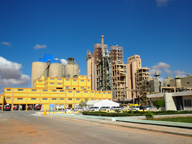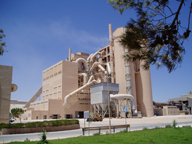Tripoli, 4 May:
One hundred striking workers at the Libya Cement Company, an Austrian joint venture, are demanding that all 2,400 employees . . .[restrict]be given ten percent of the shares in the business.
Some of the picketing strikers are also said to be calling for LCC to be re-nationalised.
The industrial action which began on 1 May at LCC’s Benghazi plant, has not spread to the firm’s other two facilities at Hawari and Al-Fataiah, near Derna said company spokesman Vladimir Markovic in Tripoli tonight. The Benghazi plant was still working but because of the strike, production was down by between ten and 20 percent.
LCC is a joint venture with Austria’s Asamer, dating from 2008. Asamer and local partner the Economic and Social Development Fund (ESDF) each own half of the business. EDSF and Asamer also have a concrete plant in Tajoura, Tripoli.
Markovic said that the provision of equity for workers, as demanded by the strikers, was a matter for both partners on the LCC board and the Libyan government. He was hoping that the Libyan government would be intervening to help resolve the dispute and persuade the minority of strikers to return to work. He added that the majority of LCCs workers were concerned at the disruption and worried about their own jobs.

Before the revolution, LCC was supplying a third of Libyan cement. All operations were suspended during the revolution. When the cement plants started up again in January, Asamer warmly praised the “loyalty” of its local employees. They had, it said, formed groups to protect the facilities, which in the event sustained no damage during the fighting. Asamer managers, led by LCC managing director Bob Solomon, returned to Libya last November to oversee repairs and maintenance in advance of the production restart. The company reported at the time that among the challenges were securing supplies of gas, power, fuel and explosive materials.
Some observers have been surprised by the militancy of this small section of the LCC workforce. Markovic this evening told Libya Herald that at the start of the year, LCC had paid its workers LD 30 million, representing 80 percent of the wages that they had lost during the shut down during the revolution. Markovic said that the remaining 20 percent of outstanding salaries would be settled shortly.
“Among foreign companies, we are one of the largest employers in Libya” he said, “We were also the very first foreign company to re-start operations after the revolution.” He added that Asamer was quick to announce its support for the revolution, when other foreign concerns with Libyan business were still sitting on the fence.
During the revolution, Asamer organised three relief convoys from Egypt to Benghazi, carrying food and medicines. The medicines were delivered to Benghazi hospital and the food was given to LCC’s workforce.
The company also boasts of its strong environmental credentials. In 2010 it completed the installation of filter systems on all its three plants, slashing the long-standing emission of pollution by 95% and also improving product quality.
There can be little doubt that this dispute comes at an awkward time for the cement firm.
Foreign construction companies, which have been the major buyers of its cement and concrete, are only now returning to Libya, and Asamer has said the local market has been slow to pick up.
However in a recent statement, the Austrian company asserted that it was optimistic there would be a sustainable and long-lasting construction boom from which it would benefit. The 45 year-old Asamer has operations in 17 countries throughout Europe, Asia and North Africa.
[/restrict]









